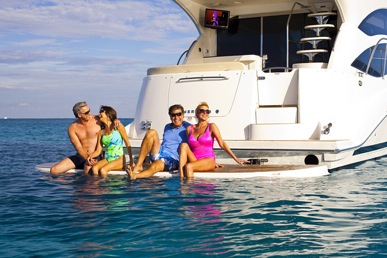These days, there’s renewed interest in going boating on a budget — something I’ve been doing for 40 years. One way is through what the boating press calls “fractional ownership,” where you share a high-end, pricey boat with others like a condo timeshare. Another cost-cutter is to go in with another boater in a less formal fashion on a used boat, as a friend of mine just did last season with a 28-foot Sea Ray.
Twelve years ago, I bought a boat with two other people. The partnership sailed for two summers. During that time, our 32-foot “friend ship” morphed into a love boat. Two of the owners fell in love, got married and paid off the odd man, who then bought his own boat.
I learned quite a lot from that boat co-op. I learned that organization, scheduling and leadership do not come naturally to some of us. And control freaks do not enjoy multiple ownership setups. Joint ownership is not simple, nor easy, compared to solo going.
Yet seven years later, I agreed to try it again with another boat. Perhaps I’ve mellowed a bit after a decade of marriage. I’ve also aged. I appreciate the shared enjoyment and workload of a co-op boat more than I used to. So we tried it again, setting up a second partnership in 2006 to operate and maintain a large, elderly wooden boat.
Our first effort, like that of my friend with the Sea Ray partnership, was only slightly more organized that the typical college-roommates-sharing-a-house endeavor. We did try to establish some ground rules, with the help of a six-pack in the cockpit shortly after the purchase, but nothing ever got into writing.
Boat co-ops can work, providing the owners use some common sense, keep communicating, and exercise as much tolerance and flexibility as possible. But you need ground rules. My friend with the Sea Ray, after just one season, is already complaining about being stuck with all the maintenance.
Tips for First Timers
Boat partners should put down on paper the partnership structure and rules of operation. The contract need not be long and complex, but it must be mutually understood by all parties. (There are boilerplate examples online to use as guides.) It should consider things such as: Will the boat be in one name only, or will all partners be listed as owners? If only one person is listed as owner, is he or she financially sound and responsible? This could be hard on the rest of the boat owners and their bank accounts. And don’t forget to check on insurance implications if the boat is in one name only.
You should also consider what your group will do if one partner wishes to sell out or is forced to drop out. Will you then have to sell the boat? Can the other partners pay off the departing member? And can you afford to operate the boat without that partner for a full season while you seek another or market the boat? I’ve seen several co-ops that broke up with painful results to the partners’ pocketbooks. And friendships. One way to keep the pressure down is to buy a cheap enough boat so that, in an unexpected financial crunch, you can still manage payments, maintenance and dock fees with one less partner.
A common source of friction in boat partnerships is scheduling. Some groups schedule weekly blocks, others use shorter intervals. In our first co-op, we set up a web page with everyone’s schedule on it. If one person wanted to use the boat on another person’s day, he could check to see whose day it was and then call them to determine the yacht’s availability. This worked pretty well for about a month. The second year, the scheduling process broke down totally.

Another frequent hazard to smooth sailing partnerships is financial inequality and the resulting differences of opinion among the owners as to what is essential to your yachting operations. Is it OK for one person to install (and remove) “their” chartplotter or Porta Potti? Do we really need a new stereo? We worked up a “budget” with a small-ish reserve fund for repairs and unforeseen costs for our current co-op (organized as a LLC). A written budget helps keep tightwads and free spenders on the same wavelength. It’s easy to lose track of costs if each person acts independently, buying hardware or goodies for the boat.
It also helps to keep track of when a part or piece of gear was purchased or replaced for that maintenance log you should be keeping. And with more than one person working on the boat, you definitely do need a written maintenance log. You also better figure out a way to assign costs if someone drops an important piece of the boat overboard, hits the dock really hard or does something else dumb. Hey, it happens.
Who’s the Boss?
Many co-ops struggle to divide up maintenance chores in an equitable manner. If one owner is handier or has more time than another, perhaps he or she can do more of the maintenance while the other partner pays more of the costs. (In theory, that’s what is supposed to happen with our current co-op, where we assign labor a $15 an hour value). However you assign the chores, communication and written records are essential. And do keep each other informed of any operating problems, funny noises from the engine room or other anomalies. Ideally, your ship’s log will note engine hours, pump outs, equipment additions, and minor repairs and incidents during use.
Several other boat co-owners I’ve talked to mentioned the difficulty of having two captains aboard. What starts out as a minor annoyance can grow to become a major source of irritation. Perhaps one solution to avoid sailing with two “skippers” when using the other owners as crew is to agree ahead of time that command falls to the person whose calendar “day” it is.
Our first boat co-op was short lived, and its dissolution was casual. However, I have heard of other partnerships where dissolution was not so amiable. Something to consider well before the initial purchase is how can we exit from this deal? One uncommonly sensible article on the Internet even suggests you find the partners before you find the boat. But as my spouse would say, that takes all the challenge out of it!
Our second effort included forming a LLC with the boat as its asset. Like a corporation, it is a legal entity that owns the asset. The people are members, and there is a considerable amount of paperwork involved in organizing it and in record keeping. In some states, there are also annual fees and or tax returns (even if there’s no income). Requirements for forming them in the U.S vary from state to state, and the Internet claims at least in some states you can easily fill out the forms yourself. There may be filing fees and some costs to advertise the LLC formation and with maintaining the checking account. Some of the high-end “fractional ownership” deals that involve new boats and way more money than anything we’ll ever be affiliated with use the LLC structure.
Because of the record keeping required, in theory, when it comes time to sell the boat, each member should get a simple percentage of the proceeds based on membership share. Then, we dissolve the LLC. We shall see. We haven’t done it yet.
Our current co-op requires a minimum financial stake and a training process before members are “qualified” to take the boat out. We usually work on the boat together in the spring and take on various smaller projects independently. Several articles on the Internet about shared ownership mention the difficulty of finding other interested potential partners. We, too, have found that it’s not easy to find responsible energetic boat caregivers. But a core membership of four to five has so far been pitching in to keep our old woodie going.
Co-ops are not simple. I wouldn’t attempt the management or accounting skills involved in the LLC. Yet, creating a little community united in the quest to keep the boat afloat and enjoy using her has been interesting. It can work for the right mix of personalities.
Editor’s note: This article was adapted from the author’s budget boating ebook. Visit www.chimneybluff.com for info or to purchase this or other titles on sailing and maritime heritage.



